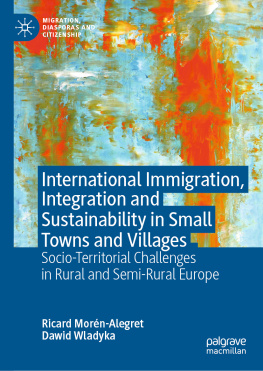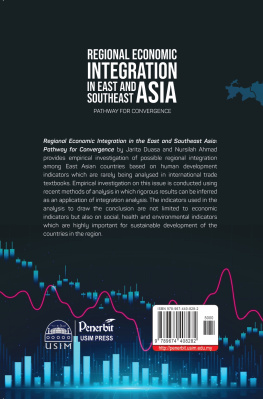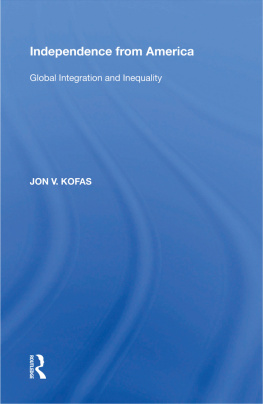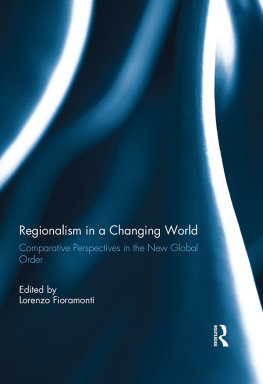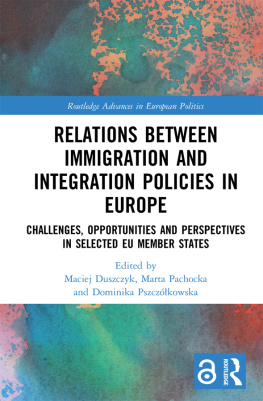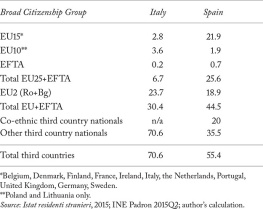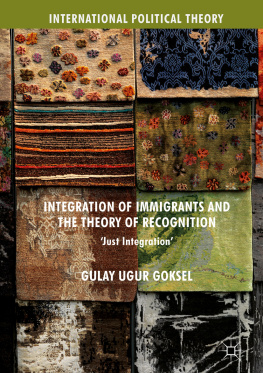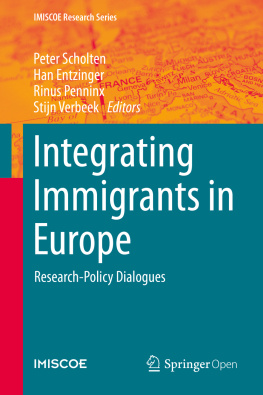First published 2002 by Ashgate Publishing
Published 2017 by Routledge
2 Park Square, Milton Park, Abingdon, Oxon, OX14 4RN
711 Third Avenue, New York, NY 10017, USA
Routledge is an imprint of the Taylor & Francis Group, an informa business
Copyright Ricard Morn-Alegret 2002
The author has asserted his moral right under the Copyright, Designs and Patents Act, 1988, to be identified as the author of this work.
All rights reserved. No part of this book may be reprinted or reproduced or utilised in any form or by any electronic, mechanical, or other means, now known or hereafter invented, including photocopying and recording, or in any information storage or retrieval system, without permission in writing from the publishers.
Notice:
Product or corporate names may be trademarks or registered trademarks, and are used only for identification and explanation without intent to infringe.
British Library Cataloguing in Publication Data
Morn-Alegret, Ricard
Integration and resistance: the relation of social
organisations, global capital, governments and
international immigration in Spain and Portugal.
(Research in migration and ethnic relations series)
1. Social integration - Spain 2. Social integration
Portugal 3. Spain - Emigration and immigration 4. Portugal
Emigration and immigration 5. Spain - Emigration and
immigration - Government policy 6. Portugal - Emigration and
immigration - Government policy
I. Title
304.8'46
Library of Congress Control Number: 2001098444
ISBN 13: 978-0-7546-1944-4 (hbk)
This book, like most books based on social research, is the outcome of a collective work. It is not possible to locate it out of some social contexts and its realisation would not have been possible without the mutual-help of friends, family, comrades, colleagues, interviewees, by-passers, by-standers, people in general. However, this book is based on a PhD thesis and the academic system has designed that thesis should be done by 'individuals', and thus behind these words there is just one responsible writer who has been working for some years to produce them.
The origin of this piece of work is back in January 1992, when I joined an 'anti-racist' association in Barcelona, after seeing some posters in the inner city walls. My previous associative experience in the late 1980s finished because splits between groups and disorientation. But, you know the words, never give up! In early 1992 I was looking for some social involvement and as a result I ended up participating actively and passionately in such 'anti-racist' organisation for some years, and by the exchanges with research-colleagues and friends Miguel Solana and Berta Pongiluppi. The collaborator in that fieldwork Abderrahman Ihaddouten was an older friend who was helpful in later fieldwork and deserves special mention here. Abdelhak El-Haddouti a member of a solidarity group then, and later a founding member of Associaci d'Immigrants Marroquins a Catalunya Ana Quo and Haun Xia were also helpful. Although I have not used data from that research, I learned a number of skills useful for this book during my participation there. Furthermore, another colleague, Cristobal Mendoza, from the distance, also influenced this book by suggesting a comparative Iberian dimension. Since that incorporation to academic research I have also participated in diverse social organisations and movements that, when relevant, will be noted in this book.
have been necessary to allow me to work full time for three years on a research that has only a partial outcome here. However, the human support received deserves more detail and text, and I will approach it below in a geographical way. Starting from Britain, the thesis on which this book is based was written at the Centre for Research on Ethnic Relations, CRER, at the University of Warwick, and it was possible thanks to the support and advice of my supervisor Zig Layton-Henry. Steve Vertovec was my second supervisor during my first year there, until he moved to Oxford University, and he gave me some helpful advice as well. John Rex dedicated hours to read and comment on my theoretical chapters. Danile Joly, the new CRER director, was also supportive to the development of the thesis and kindly invited me to share some of its topics with other colleagues in seminars and with MA students in lectures. I am also thankful to all my other colleagues at CRER for their fellowship, especially to Marie Verhoeven and Mara Garca-Cano, for their comments on a draft of the conclusions. Edgar Hassan kept social life active since my early days at Warwick University. Other British-based useful critical readings were done by Rui Alburquerque (he also supervised the Portuguese quotations), Julie Ryder and Stefano Schergna. The latter ones together with Arne Hintz, John Liddamore and a few other members of the ecologist group kept socialisation active. My brother Daniel put more music in my life while sharing flat in Earlsdon during his migration to England and gave me his full support, including good comments on a draft. I am also grateful to Carolyn Gifford who edited the text in Leamington Spa. Furthermore, Sergio Requena, a Coventry-based MSF trade unionist of Chilean origin, was helpful in acknowledging how far neoliberal inspired policies can go in destroying resistance movements and social life (both in Britain and Chile). And the Coventry Peace House did show me that it is not easy to (re)start transformative social projects, because systemic dynamics kill such projects. This is specially true in a decadent city like 'neoliberal Coventry' is at the turn of the century. Finally, I am grateful to Russell King (Sussex University) for his comments as external examiner of the PhD thesis and his support for publication, Alisdair Rogers (Oxford University) and Davide Per (Sussex University) for their comments on one of the chapters, John Wrench (University of Southern Denmark) for his advice, and the Ashgate staff for their work.
In Iberia, I am grateful to all the interviewees and people who shared information, time and space, especially those who think, say, and act in order to transform this planet into a more fair, free and equal one, where all people can get rid of those who oppress us and where we can self-manage our lives.
In Portugal, I am grateful to Maria Beatriz Rocha-Trindade, Telma Viegas and Armando Oliveira at the Universidade Aberta, Jorge Melheiros at Universidade de Lisboa, and Maria Baganha at Universidade de Coimbra for their help at fieldwork. Many thanks also to friends and comrades in several Lisbon-based social organisations and movements, the list is a long one. Moreover, I am specially grateful to Nelia Johnston and my new African social-family that hosted me in Vale de Amoreira and Baixa da Banheira everytime I visited the southern periphery of Lisbon: sisters Sandra, Sheila and Zucca, nephew little Nelia, brothers Nando and Joel, grandmother Elena ( av ), and other nice people over there.


